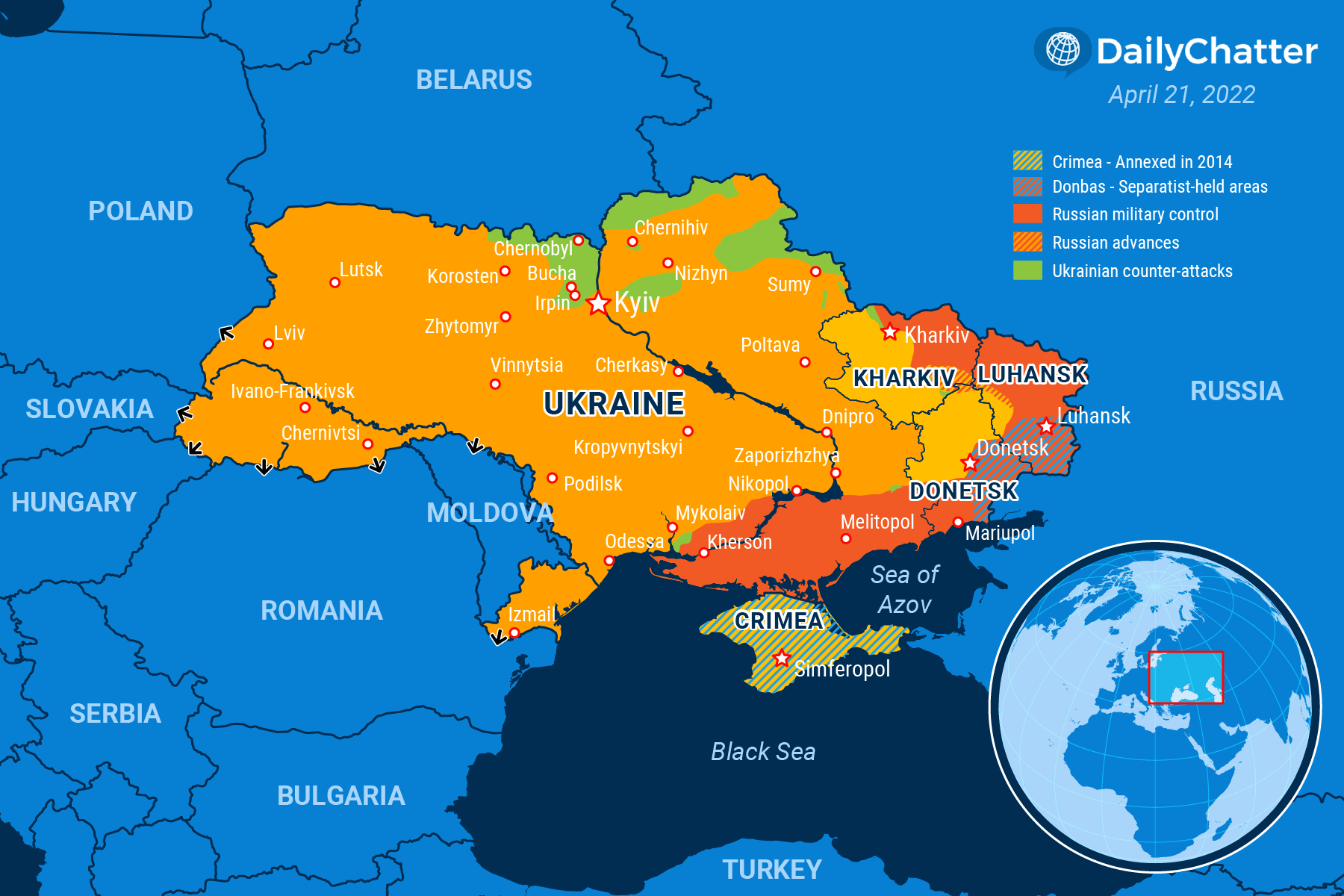
The World Today for April 25, 2022
NEED TO KNOW
Coming Together, Coming Apart
UKRAINE

It’s been two months since Russia invaded Ukraine to push back against alleged NATO encroachments and bring back into the fold an important region of the former Soviet Union and the late Czarist Russian Empire.
Of course, some say that Russia’s invasion really began when troops annexed the former Ukrainian territory of the Crimean Peninsula in 2014. From that perspective, as CNBC recounted, the last two months have been a violent escalation of years of pressure.
Either way, when Russian President Vladimir Putin ordered his forces to attack Ukraine from Russian-held separatist zones in the country’s eastern regions, Crimea and the former Soviet republic of Belarus, he aimed to quickly seize Kyiv. But he failed to achieve that goal.
“The myth about the invincibility of the Russian military as the second-most powerful in the world has been shattered to much surprise of the Ukrainians themselves,” Oleh Zhdanov, a Ukrainian military expert, explained to the Associated Press.
Now, Putin has had to rejigger his plans, the Indian Express explained. The Russian president intends to entrench his forces in Donbas, using the separatist region as a base for further attacks to the west.
In the meantime, the so-called special military operation, as Putin described it, has radically altered Ukraine and also the world. In Ukraine, thousands have died – no one knows exactly how many people have been killed but the UN has counted 2,345, while Ukraine says 20,000 have died in Mariupol alone. And many cities are unrecognizable, as this before-and-after photo essay shows: Skeletons of buildings on pockmarked roads, bombed-out shopping centers and crumbling hospitals are now the cityscape of Kharkiv, parts of greater Kyiv and elsewhere. Mariupol is almost flattened.
At the same time, like an upset apple cart, the geopolitics are quickly changing as Russia continues its invasion, wrote the Washington Post, citing new waves of migrants in Europe that have topped five million, harsh Western sanctions, a boom in German defense spending and other big changes that Putin triggered with the invasion.
These changes could fragment the global order, warned the Official Monetary and Financial Institutions Forum. Their worst-case scenario involved the use of nuclear weapons and the reemergence of a Cold War paradigm where democracies stand opposed to totalitarian states.
China is certainly strengthening its ties with Russia, reported Bloomberg, noting how trade between the two countries has increased by 30 percent in the first quarter of the year. Saudi Arabian Crown Prince Mohammed bin Salman, whose poor human rights record puts him in good company with Putin and Chinese President Xi Jinping, has suggested he might align his oil-rich kingdom with Russia and China, too.
Such an alliance has fueled fears about the value of the US dollar plummeting, as Jacobin magazine noted.
But the US and Western European countries have also bonded together more closely through NATO, Vox added. Germany’s decision to become more involved militarily and diplomatically is potentially a gamechanger in Europe, too.
How things will shake out is unknown. But first, the shaking must stop.
To read the full edition and support independent journalism, join our community of informed readers and subscribe today!
Not already a subscriber?
If you would like to receive DailyChatter directly to your inbox each morning, subscribe below with a free two-week trial.
Support journalism that’s independent, non-partisan, and fair.
If you are a student or faculty with a valid school email, you can sign up for a FREE student subscription or faculty subscription.
Questions? Write to us at [email protected].
